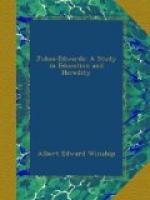The father of “The Jukes” Mr. Dugdale styled “Max.” He was born about 1720 of Dutch stock. Had he remained with his home folk in the town and been educated, and thrifty like the rest of the boys, he might have given the world a very different kind of family from “The Jukes.”
Max was a jolly good fellow and not very bad. He was popular and he could tell a good story that made everybody laugh. Of course he was vulgar, such jolly good fellows are usually vulgar. He would not go to school, because he did not like it. He would not stay in evenings, for he did not like that. He did not enjoy being talked to, but always wanted to talk himself, and to talk to boys who would laugh at his yarns. He would not work for he did not like it. He wanted to go fishing, hunting, and trapping; so he left home early and took to the woods.
Max liked nature. He thought he was lots better than town people because he knew more about nature. He found a lovely spot on the border of a beautiful lake in New York State, where the rocks are grand, the waters lovely, the forest glorious. There was never a more charming place in which to be good and to love God than this place where Max built his shanty about 1750. But he did not go there to worship or to be good. He went simply to get away from good people, to get where he would not have to work, and where he would not be preached to, and this beautiful spot became a notorious cradle of crime. Nature is lovely, but it makes all the difference in the world how we know nature and why we love it.
In 1874 Richard L. Dugdale was employed by the New York Prison Commission to visit the prisons of the state. In this visit he was surprised to find criminals in six different prisons whose relatives were mostly criminals or paupers, and the more surprised to discover that these six criminals, under four different names, were all descended from the same family. This led Mr. Dugdale to study their relatives, living and dead. He gave himself up to this work with great zeal, studying the court and prison records, reports of town poorhouses, and the testimony of old neighbors and employers. He learned the details of 540 descendants of Max in five generations. He learned the exact facts about 169 who married into the family. It is customary to count as of a family the men who marry into it. He traced in part others, which carried the number up to 1,200 persons of the family of the Jukes.
The Jukes rarely married foreign-born men or women, so that it may be styled a distinctively American family. The almost universal traits of the family were idleness, ignorance, and vulgarity. They would not work, they could not be made to study, and they loved vulgarity. These characteristics led to disease and disgrace, to pauperism and crime. They were a disgustingly diseased family as a whole. There were many imbeciles and many insane. Those of “the Jukes” who tended to pauperism were rarely criminal, and those who were criminal were rarely paupers. The sick, the weak, and goody-goody ones were almost all paupers; the healthy, strong ones were criminals.




